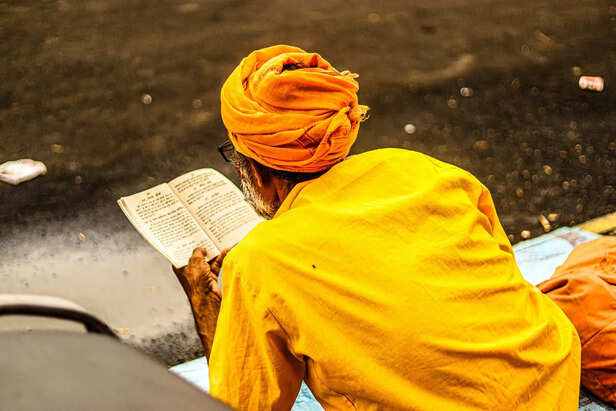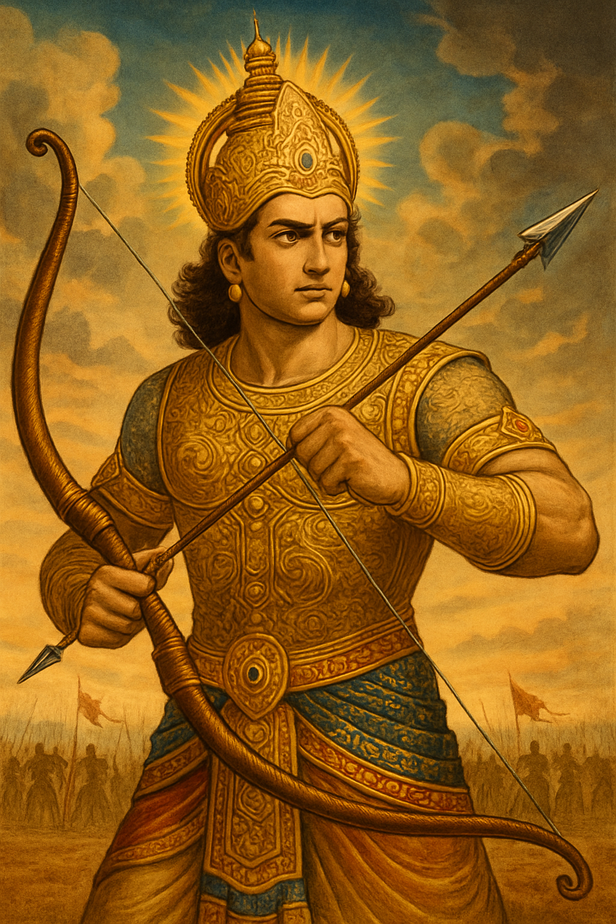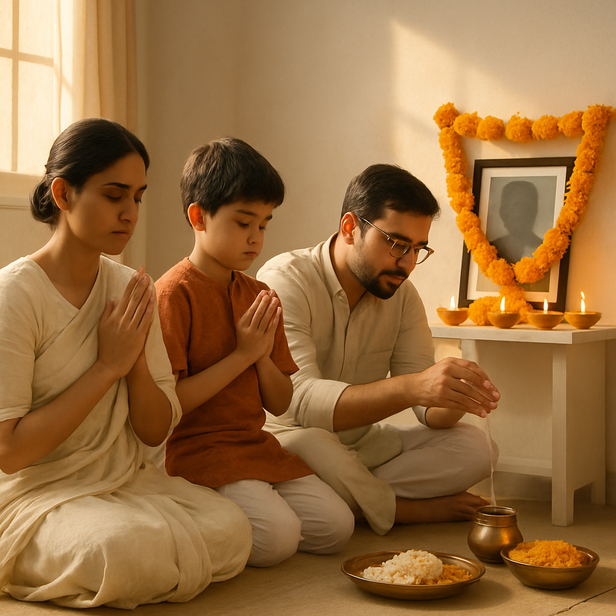The Story Behind Shradh: Lessons from the Mahabharata and Karna’s Tale
Megha Jangra | Sep 10, 2025, 22:57 IST
Karna’s Crucial Moment: The Archer's Decision
( Image credit : Times Life Bureau )
Shradh, observed during Pitru Paksha, is an ancient Hindu practice of honoring ancestors with food, water, and prayers. Hindu scriptures speak of these offerings as a sacred duty. Later oral traditions connect this ritual to a moving tale of Karna from the Mahabharata, giving a human face to an age-old practice. Together, they offer timeless lessons on gratitude, duty, and the invisible bonds that link generations.
Every September–October, many Hindu families observe Pitru Paksha, a fortnight dedicated to remembering ancestors. They prepare simple meals, offer water, and perform rituals known as Shradh, believed to bring peace to departed souls and blessings to descendants.
But where does this practice come from, and what does it mean beyond ritual? The answer lies partly in scripture and partly in storytelling, a blend of Vedic instructions, Dharma texts, and cultural narratives. One such story comes from the Mahabharata’s beloved yet tragic hero: Karna.

Shradh has deep roots in Hindu scriptures. The Rig Veda (10.15) mentions offering prayers and blessings to ancestors, highlighting its sacred importance. The Garuda Purana (Pretakalpa, Chapters 10–12) provides guidelines for performing Shradh, emphasizing that offerings bring peace to departed souls and blessings to descendants. Other ancient texts, including the Manusmriti and Yajur Veda, also refer to ancestor offerings, showing that this concept has been central to Hindu tradition for centuries.

According to widely told oral traditions based on the Mahabharata’s character Karna, a powerful lesson emerges.
Karna, known for his unmatched generosity, gave away gold, jewels, and wealth to anyone who asked. Yet, after his death in the Kurukshetra war, he found himself in a strange situation: in the afterlife, instead of food, he was served only gold and jewels.
When he asked why, he was told: “You gave away riches on Earth but never offered food or water to your ancestors. Your generosity skipped a duty that nourishes the bonds between worlds.”
Moved with regret, Karna prayed for a chance to set things right. The divine powers, as the story goes, allowed him to return to Earth briefly to perform Shradh, feeding the poor and offering food and water in the name of his forefathers. This event, symbolic rather than literal in the core Sanskrit text, became one way the importance of Shradh was passed down: not through fear, but through the reminder that even the greatest heroes must honor the quiet duties of lineage.
1. Gratitude Beyond the Living: Honoring ancestors is not just ritual; it’s acknowledgment. We are not self-made, we inherit life, values, and opportunities from those who came before us. Shradh keeps that gratitude alive across generations.
2. Simple Acts, Profound Impact: Karna gave away treasures but missed the spiritual value of food and water. The story reminds us that sometimes the simplest offerings a meal shared, a prayer whispered carry deeper meaning than grand displays.
3. Dharma Is Interconnected: Hindu philosophy treats duty (dharma) as layered to oneself, to family, to society, and to the divine. Neglecting one weakens the whole. Shradh represents the family layer: quiet, invisible, but essential.
4. Do What You Can, While You Can: Karna’s return was a gift, a symbolic “second chance.” Most of us don’t get that. The story urges action in the present fulfilling duties of gratitude and care before regret teaches what wisdom could have.

Today, Shradh is observed differently across India. Some families perform full Vedic rituals with priests; others simply cook a favorite meal of a departed loved one, offer water, or spend time in remembrance.
Whether through sacred chants or silent reflection, the essence remains: acknowledging a lineage that connects the living and the departed, reinforcing humility, gratitude, and continuity in a rapidly changing world.
The story of Karna and the instructions of ancient Hindu scriptures meet at a single truth: remembrance is powerful. Shradh is not merely about ritual correctness; it’s about respect, gratitude, and emotional balance, a way to honor those who shaped the path we walk today.
By understanding its scriptural roots and the wisdom hidden in its stories, we see Shradh not as superstition, but as a deeply human practice, a quiet bridge between what was, what is, and what will be.
FAQs(Frequently Asked Questions):
But where does this practice come from, and what does it mean beyond ritual? The answer lies partly in scripture and partly in storytelling, a blend of Vedic instructions, Dharma texts, and cultural narratives. One such story comes from the Mahabharata’s beloved yet tragic hero: Karna.
Spiritual Foundations of Shradh

Wisdom from Ancient Texts
( Image credit : Unsplash )
Shradh has deep roots in Hindu scriptures. The Rig Veda (10.15) mentions offering prayers and blessings to ancestors, highlighting its sacred importance. The Garuda Purana (Pretakalpa, Chapters 10–12) provides guidelines for performing Shradh, emphasizing that offerings bring peace to departed souls and blessings to descendants. Other ancient texts, including the Manusmriti and Yajur Veda, also refer to ancestor offerings, showing that this concept has been central to Hindu tradition for centuries.
The Tale of Karna: Generosity with a Missing Link

The Generous Warrior of Mahabharata
( Image credit : Times Life Bureau )
According to widely told oral traditions based on the Mahabharata’s character Karna, a powerful lesson emerges.
Karna, known for his unmatched generosity, gave away gold, jewels, and wealth to anyone who asked. Yet, after his death in the Kurukshetra war, he found himself in a strange situation: in the afterlife, instead of food, he was served only gold and jewels.
When he asked why, he was told: “You gave away riches on Earth but never offered food or water to your ancestors. Your generosity skipped a duty that nourishes the bonds between worlds.”
Moved with regret, Karna prayed for a chance to set things right. The divine powers, as the story goes, allowed him to return to Earth briefly to perform Shradh, feeding the poor and offering food and water in the name of his forefathers. This event, symbolic rather than literal in the core Sanskrit text, became one way the importance of Shradh was passed down: not through fear, but through the reminder that even the greatest heroes must honor the quiet duties of lineage.
Lessons for Then and Now
2. Simple Acts, Profound Impact: Karna gave away treasures but missed the spiritual value of food and water. The story reminds us that sometimes the simplest offerings a meal shared, a prayer whispered carry deeper meaning than grand displays.
3. Dharma Is Interconnected: Hindu philosophy treats duty (dharma) as layered to oneself, to family, to society, and to the divine. Neglecting one weakens the whole. Shradh represents the family layer: quiet, invisible, but essential.
4. Do What You Can, While You Can: Karna’s return was a gift, a symbolic “second chance.” Most of us don’t get that. The story urges action in the present fulfilling duties of gratitude and care before regret teaches what wisdom could have.
Shradh in a Modern Context

Modern Shradh: Honoring Ancestral Bonds
( Image credit : Times Life Bureau )
Today, Shradh is observed differently across India. Some families perform full Vedic rituals with priests; others simply cook a favorite meal of a departed loved one, offer water, or spend time in remembrance.
Whether through sacred chants or silent reflection, the essence remains: acknowledging a lineage that connects the living and the departed, reinforcing humility, gratitude, and continuity in a rapidly changing world.
The Takeaway
By understanding its scriptural roots and the wisdom hidden in its stories, we see Shradh not as superstition, but as a deeply human practice, a quiet bridge between what was, what is, and what will be.
FAQs(Frequently Asked Questions):
- How is Karna connected to Shradh rituals?
According to popular oral tradition inspired by the Mahabharata, Karna realized after his death that he had never offered food to his ancestors. His brief return to perform Shradh highlights the importance of remembering ancestors with devotion and fulfilling one’s duties. - What offerings are made during Shradh?
Traditional Shradh offerings include pinda (rice balls), water, sesame seeds, and vegetarian food. These symbolize nourishment for ancestors, and some families also perform charitable acts like feeding the poor in their memory. - What is Shradh and why is it important?
Shradh is a Hindu ritual performed during Pitru Paksha to honor ancestors. It involves offering food, water, and prayers, which helps maintain a spiritual connection, express gratitude, and seek blessings from departed souls.
